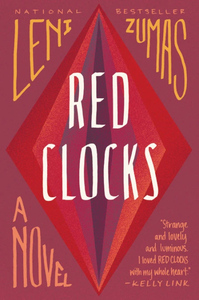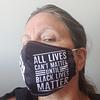Take a photo of a barcode or cover
This book is a call to action. It is a not-so-unimaginable telling of a US in which abortion is criminalized and children must be adopted into two-parent homes. It made me seethe and rage and it also scared me. Please read.
Very interesting book on the lives of five women in post "Personhood Amendment" America, that makes abortion and IVF illegal and grants the rights of life, liberty and the pursuit of happiness to unborn embryos. A new bill called "Every Child Needs Two" just passed which only allows married couples to adopt. I understand those that would put a dystopian label on this book, but I'm not sure I will as it didn't read that way to me. Because of today's political climate, what happened really isn't outside the realm of reality. The characters all live in a small coastal Oregon town and as the book progresses you see how the five women maneuver life their own way in the confines of the law. I enjoyed the characters as completely different than the others, but I did find the writing a bit disjointed and it took me a bit to get completely into the book. That's the only reason why I didn't give it four stars.
This well-written novel is set in the near future, and it’s a future that seems nearer all the time these days. The religious right has won, and abortion is illegal everywhere. Prisons are filling up with women who’ve tried to have them, and those who have tried to help them.
The book is set in Oregon, and centered around four women, and the chapters move from one to the other. My main complaint with the book is that none of the women are named at first. They’re referred to as “The Wife”, “The Daughter”, “The Biographer” and “The Mender”. Their names show up fairly soon, but this way of differentiating them persists through the book, and it’s depersonalizing. I guess the point is that, in this world, women are mainly known by their roles.
But that’s my only quibble, actually, and by the end of the book, I was used to it, and all the characters were real to me. Also real was a fifth woman, the intrepid scientist that the Biographer was writing about. Pages of the biography-in-progress are quoted between chapters centered on all four women.
All the women have some connection to the reproductive rights issue. Susan, the wife, has two children, and loves them to pieces, but she also has a husband who never notices the things that need doing in a household, and thinks of it all as the wife’s work. Gin, the mender, is a herbal healer living in the forest, eschewing company, helping townswomen with all health complaints, using a barter system. Mattie, the daughter, is 14, and finds herself pregnant. Ro, the biographer, is Mattie’s teacher, and really wants a child. But the same laws that outlaw abortion have made IVF techniques illegal, and have prohibited single women from adopting.
In the novel, Gin is accused of having caused an abortion, and hauled into court, while meanwhile Mattie is trying to figure out a way to end her own pregnancy. Susan is trying to get up the nerve to leave her husband, and calls on her truncated legal training to help Gin. Ro, meanwhile, tries to help Mattie, and ends up inspired by some women working underground to circumvent these misogynist laws.
The book is set in Oregon, and centered around four women, and the chapters move from one to the other. My main complaint with the book is that none of the women are named at first. They’re referred to as “The Wife”, “The Daughter”, “The Biographer” and “The Mender”. Their names show up fairly soon, but this way of differentiating them persists through the book, and it’s depersonalizing. I guess the point is that, in this world, women are mainly known by their roles.
But that’s my only quibble, actually, and by the end of the book, I was used to it, and all the characters were real to me. Also real was a fifth woman, the intrepid scientist that the Biographer was writing about. Pages of the biography-in-progress are quoted between chapters centered on all four women.
All the women have some connection to the reproductive rights issue. Susan, the wife, has two children, and loves them to pieces, but she also has a husband who never notices the things that need doing in a household, and thinks of it all as the wife’s work. Gin, the mender, is a herbal healer living in the forest, eschewing company, helping townswomen with all health complaints, using a barter system. Mattie, the daughter, is 14, and finds herself pregnant. Ro, the biographer, is Mattie’s teacher, and really wants a child. But the same laws that outlaw abortion have made IVF techniques illegal, and have prohibited single women from adopting.
In the novel, Gin is accused of having caused an abortion, and hauled into court, while meanwhile Mattie is trying to figure out a way to end her own pregnancy. Susan is trying to get up the nerve to leave her husband, and calls on her truncated legal training to help Gin. Ro, meanwhile, tries to help Mattie, and ends up inspired by some women working underground to circumvent these misogynist laws.
More of a character study than a dystopian exploration. Not what I expected but interesting.
I didn't read a lot of reviews of this book, before picking it out. I honestly think, after reading quite a few reviews, this book is better as an audiobook. I didn't read this one, and in a way, it must've benefited me. I really enjoyed the style and snippets of stories as they all come together in a small Oregon coastal town. It was definitely odd in places, but I kinda liked the oddness. I enjoyed each woman's internal struggle, and the bias of looking on others with contempt or jealousy, even as the reader/listener knows the object's personal failings and fears do not align with the assumptions of the other characters.
In this, I will say that while the female leads were fairly well drawn, the male characters, while none were leads, served more as props to the women's narratives rather than full characters with whom the female narrators interact with and have, in some cases, deep and meaningful relationships with. It's not a dealbreaker, but could've been done with better execution.
All in all, this was an interesting listen. I recommend trying it on audiobook, if you're not down for experimental or super stylized writing.
In this, I will say that while the female leads were fairly well drawn, the male characters, while none were leads, served more as props to the women's narratives rather than full characters with whom the female narrators interact with and have, in some cases, deep and meaningful relationships with. It's not a dealbreaker, but could've been done with better execution.
All in all, this was an interesting listen. I recommend trying it on audiobook, if you're not down for experimental or super stylized writing.
Frightening to think about how close we are to this kind of world now that we are in a post-Roe world.
Probably would have liked this more if scotus and magats hadn’t unknowingly changed the book’s categorization from fiction to GOP party platform. Aside from that, the entire book felt unemotional and cold. The characters’ rage in each of their situation didn’t match the severity of their predicament. Maybe that was the point, that the book served a sociological purpose, but overall it was just…meh.
When this was published in 2018, the idea of the US banning abortion and abortion-seekers being turned away at the "Pink Wall" when trying to gain entry to Canada... Well, it was a horrifying dystopian future that surely could never come true.
And now it's here, or almost here. Which is one reason it's a hard read.
Another reason is because the author's style - changing POV from a 19th century female scientist to a teacher to a teen girl to a wife/mother is a little jarring and confusing. It's still very, very well written, but sometimes I forgot whose head I was in.
And now it's here, or almost here. Which is one reason it's a hard read.
Another reason is because the author's style - changing POV from a 19th century female scientist to a teacher to a teen girl to a wife/mother is a little jarring and confusing. It's still very, very well written, but sometimes I forgot whose head I was in.
So so so good. SO GOOD. Really weird and scary, but really well-written and intriguing and different. And it takes place in Oregon!
I wasn't bowled over by this book, but it was a good enough read. Scary foreshadowing in that our current political situation may be putting us at risk of ending up with women's rights/reproductive rights being stripped away as they are in the book.



